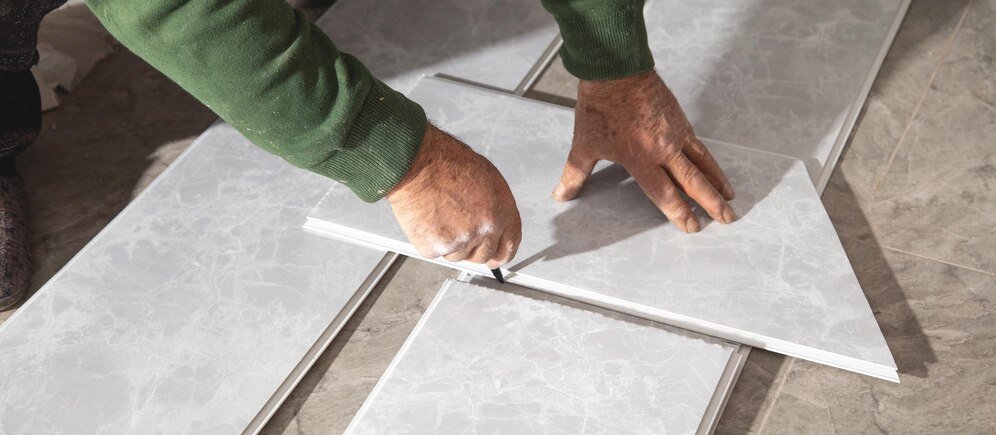How Much Do Tile Setters Make?
Tile setting remains a skilled trade with a tangible impact on both construction and home improvement industries. The compensation for tile setters can vary significantly based on several factors, including geographic location, experience, and the type of projects undertaken. As the industry evolves, so does the earning potential and job outlook for professionals in this field. An understanding of the current salary trends is crucial for those considering a career as a tile setter, as well as for professionals aiming to negotiate their wages or evaluate their career growth options.
The earnings of tile setters in the United States reflect the specialized nature of their work. Labor statistics show that hourly wages for this occupation adjust to market demands, with rates influenced by factors such as level of expertise, regional cost of living, and the availability of skilled labor. Additionally, tile setters have opportunities to progress in their careers, which can lead to higher pay rates and enhanced job satisfaction. Recognizing the variations in pay can assist individuals in making informed decisions about entering the trade and advancing within it.
Key Takeaways
- Tile setters’ salaries are influenced by experience, location, and project type.
- Salary trends can guide career decisions within the tile setting industry.
- Career advancement opportunities can lead to higher income.
Overview of Tile Setter Profession
Tile setters have the specialized task of installing tiles made from materials such as marble, granite, and ceramic. They are responsible for the aesthetics and functionality of tiled spaces.
What Are the Role and Responsibilities of Tile Setters?
Tile setters are skilled tradespeople who precisely cut, install, and grout various types of tile. They interpret blueprints and work to architectural specifications to cover surfaces like floors, showers, countertops, and walls. Their work ensures that the tiles are correctly aligned, evenly spaced, and securely affixed to the substrate. They need to prepare the surfaces before tiling and may need to remove existing material.
Which Types of Tiles and Materials Do Tile Setters Work With?
Tile setters commonly work with a multitude of tile materials:
- Ceramic: Popular for its versatility and durability.
- Marble: Chosen for its high-end finish and elegance.
- Granite: Utilized for its strength and resistance to heat. Each material requires specific knowledge and handling techniques to ensure the longevity and beauty of the installation.
What Are the Essential Skills for Tile Setters?
To be successful in their profession, tile setters require a variety of skills:
- Precision: Meticulous measuring and cutting to ensure proper fit.
- Attention to Detail: Close examination of patterns and alignment.
- Physical Stamina: Capability to lift heavy materials and spend long hours on their knees.
- Math Skills: Strong abilities in geometry and arithmetic for accurate layout work.
Earning Potential of Tile Setters
The income of tile setters can vary based on various factors and can be calculated on an hourly basis or as an annual salary, with total compensation including additional forms of payment.
What Influences Tile Setter Salaries?
Several elements determine a tile setter’s earning potential. Geographical location plays a pivotal role; tile setters in metropolitan areas may command higher wages compared to those in rural regions. Experience level is also key, as seasoned professionals usually bring in more income. Furthermore, the demand for tile setting in the construction industry can cause salary fluctuations.
How Do Hourly and Annual Pay Compare for Tile Setters?
Tile setters may be compensated through hourly wages or an annual salary. Hourly payment typically allows for overtime earnings which can boost total compensation, while annual salaries are fixed regardless of hours worked. For reference, the average hourly rate for a tile setter is approximately $24.07, though this can be as low as $14.75 or climb to $39.27. In contrast, annual wages may range from $43,112 to $55,246, influenced by factors like locality, experience, and market demands. Some estimates even suggest the potential for a total pay of $101,828 per year, illustrating the considerable variance in the field.
Tile Setter Salaries Across the United States
Tile setters play a crucial role in construction and remodeling projects, with their compensation varying significantly across different regions in the United States.
What Is the State-by-State Salary Comparison for Tile Setters?
When looking at state-by-state salary comparisons, it’s evident that the location significantly influences tile setters’ earnings. In states like New York and California, tile setters can expect higher wages, reflective of the cost of living and demand for skilled labor. For example, Indeed reports average hourly wages of $24.07. In contrast, states with a lower cost of living, such as Arkansas and Alabama, may offer lower average wages.
- New York: Higher average hourly wage due to the cost of living and construction demands.
- California: Similar to New York with a comparative wage scale.
- Alabama: Lower average wages, reflecting the state’s living costs.
How Does the City and Cost of Living Impact Tile Setter Pay?
The city and cost of living play critical roles in determining a tile setter’s pay. Major metropolitan areas like Chicago, Washington D.C., and Los Angeles tend to offer higher wages to offset the higher living costs in these cities. Salary.com highlights the range for tile setters can be between $43,112 and $55,246 annually.
- Washington, D.C.: Elevated salaries in response to the high cost of city living.
- Chicago: Competitive wages due to a robust construction market.
Conversely, cities in states such as Mississippi or Montana could see lower compensation, aligning with the lower expenses associated with living in these areas. It is important to note that while urban centers may offer higher wages, they are also associated with higher costs for housing, transportation, and general expenses.
Advancement and Career Growth
Tile setting is a skilled trade that provides clear pathways for career advancement mainly influenced by experience, skill level, and education. Individuals in this profession can move from apprenticeship to mastery, eventually managing their own business or becoming specialists in their trade.
How Does Career Progression and Seniority Affect a Tile Setter’s Earnings?
A tile setter’s career typically begins as an apprentice, acquiring skills under the direction of more experienced professionals. With years of experience, they may become journeymen and then master tile setters. Seniority often leads to increased earnings and may offer opportunities for supervisory positions or specialized projects that demand higher-level expertise. Real-world cases show that the transition from an apprentice to a tile installer is a common career advancement attributed to experience and skills gained on the job.
What Role Do Education and Certification Play in a Tile Setter’s Career?
Although formal education beyond high school is not always obligatory, it can be beneficial. Certifications and specialized training can enhance a tile setter’s qualifications. For instance, the Ceramic Tile Education Foundation (CTEF) offers a Certified Tile Installer (CTI) program that demonstrates a tile setter’s expertise. Such credentials not only validate a professional’s skills but also could potentially lead to higher earnings and preference for jobs requiring a meticulous level of detail and expertise. Education and certifications are career milestones that can help tile setters differentiate themselves and compete effectively in the market.
Understanding Salary Data
When considering compensation in the tile setting field, it’s valuable to understand the comprehensive salary data available. This data often includes aspects such as average salary figures, ranges, national averages, and various percentiles.
How Do You Read Salary Surveys?
Salary surveys are instrumental in gathering information about compensation. They usually detail the average salary, which is the sum of all salaries divided by the number of workers. These surveys might also provide the salary range, indicating the span between the lowest and highest pay. Survey participants typically include individuals across different experience levels, regions, and sectors within the field.
What Is the National Average and Percentiles?
The national average salary is a single value that represents the center of the income range across the country. Percentiles, on the other hand, divide the income data into 100 equal groups. For example, a tile setter at the 25th percentile earns more than 25% of other workers in the profession. Percentile data helps clarify where a person’s earnings stand relative to their peers. The hourly wages provided by percentile data can also be translated into weekly, monthly, or yearly income, offering a comprehensive understanding of earning potential.
Enhancing Job Satisfaction and Retention
For tile and stone setters, job satisfaction stems from a combination of favorable work conditions and recognition through benefits and incentives. Ensuring a rewarding work environment and a comprehensive benefits package can significantly improve retention rates.
How Does Work Environment and Culture Affect Job Satisfaction?
Tile and stone setters often work on floors and walls in various locations, making the condition of their work environment pivotal to job satisfaction. Employers can improve satisfaction by ensuring job sites are well-organized, safe, and that teams have the necessary equipment and space to perform installations effectively. Encouraging collaboration and offering continuous training can foster a positive culture that values skill development and workmanship.
What Benefits and Incentives Can Increase Retention?
Offering competitive compensation is just the start; providing a robust benefits and incentives package can be crucial in retaining skilled labor. Employers might offer:
- Health insurance: Critical for physical well-being given the labor-intensive nature of the job.
- Retirement plans: Provides long-term financial security, promoting loyalty.
- Performance bonuses: Rewards efficiency and quality in installation projects.
- Paid time off: Allows rest and recovery, improving overall job satisfaction.
By investing in the workforce through these measures, employers can cultivate a more dedicated and content team of tile and stone setters.
Salary Negotiation Strategies for Tile Setters
When it comes to salary negotiation for tile setters, it’s imperative to understand the value of one’s skill and experiencein the industry. Here are some strategies to consider:
- Know Your Worth: Research the average tile setter salary in your area and consider your own skill level and experience. Websites like PayScale provide average hourly rates while Salary.com can help one understand the range of hourly wages.
- Showcase Your Skills: Emphasize any specialized training or certifications you have. Including examples of complex projects can illustrate your proficiency.
- Negotiate Based on Experience: More years in the industry generally equate to a higher salary. If you are a seasoned professional, it’s reasonable to aim for the higher end of the salary range.
- Be Prepared: Go into negotiations with a clear and confident understanding of what you’re seeking. Prepare a list of your qualifications and accomplishments.
- Practice Negotiating: Role-play negotiation scenarios with someone you trust to build confidence.
| Strategies | Description |
|---|---|
| Research | Understand typical earnings in your region for your skillset. |
| Highlight Qualifications | Certifications, and project complexity illustrate skill level. |
| Leverage Experience | Use tenure in the field to justify the pay rate. |
| Preparation | Enter negotiations knowing your value and evidence to support it. |
| Practice | Rehearse negotiation discussions to gain confidence. |
An individual’s ability to negotiate effectively directly impacts their potential highest salary. Tile setters should prepare thoroughly, leveraging their skill and experience, to ensure they secure a fair compensation.
What Trends Are Shaping the Future of the Tile Setting Industry?
The tile setting industry is influenced by various trends that impact its future. Advances in materials and technology, for example, are enabling tile setters to work with a wider array of tile products, some of which require specialized installation techniques. The trend towards eco-friendly and sustainable building materials is also likely to increase demand for tile setters skilled in installing recycled or green tile products.
Job Market Evolution:
- Increased Demand: As construction booms, the demand for skilled labor, including tile setters, is expected to rise.
- Specialization: Tile setters with advanced skills in custom designs or green materials may find more opportunities.
Relevant Skills for Tomorrow’s Tile Setters:
- Ability to work with new, sustainable materials.
- Precision in custom tile design and installation.
- Proficiency in using advanced setting tools and technology.
Field Adaptations:
- The field is adapting to digital advancements with software for design, planning, and customer interaction.
- Builders are seeking tile setters who can integrate smart home technology with floor and wall tiles.
In the future, the industry will likely prioritize professionals who are adaptable and committed to lifelong learning to keep pace with evolving trends and technologies. This continuous education will be key to maintaining a lucrative and sustainable career in tile setting.
Frequently Asked Questions
Tile setters’ earnings can vary widely depending on a number of factors, including location, union membership, experience, and the nature of the work. These FAQs aim to clarify common inquiries regarding the financial aspects of this profession.
What is the average annual salary for a tile setter?
The annual salary for a tile setter can range from approximately $43,112 to $55,246 in the United States.
Which state offers the highest pay for tile setters?
Salary data often changes, but states with higher living costs tend to offer higher pay rates for tile setters.
Do unionized tile setters earn more compared to non-union professionals?
Unionized tile setters generally have higher wages and better benefits compared to non-union workers due to collective bargaining agreements.
What is the typical hourly rate for tile installation work?
The average hourly rate for a tile setter is around $24.07, with variations based on factors such as expertise and geographic location.
How do earnings for tile installers vary based on experience?
Experienced tile setters usually command higher wages due to their advanced skills and efficiency compared to those new to the profession.
What key factors influence a tile setter’s income?
Factors that influence a tile setter’s income include their level of experience, the complexity of tile work performed, their location, and whether they are part of a union.






